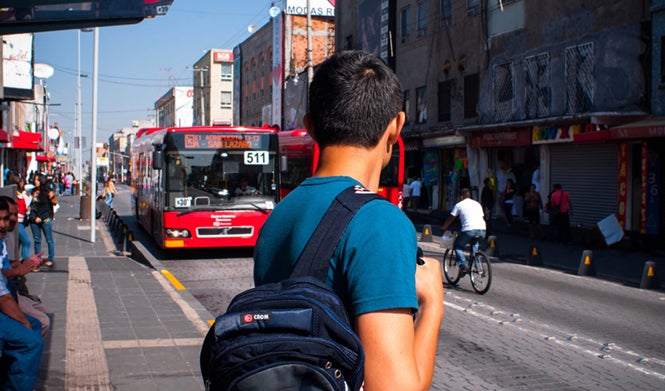
However, after promoting cleaner buses in Mexico for five years, we have seen firsthand that financial incentives alone are not enough. Specifically, there are three main obstacles that impede the expansion of cleaner bus fleets, and should be addressed appropriately.
New technologies and risk aversion
In general, private bus operators tend to be very risk averse when it comes to experimenting with new vehicle technologies. This is not exactly surprising: according to our own calculations from different projects in Latin America, variables related to vehicle performance—like fuel and maintenance—make up over 2/3 of costs over the life cycle of a conventional diesel bus. In that context, operators who are not familiar with the performance of new vehicle technologies can understandably perceive the transition to a cleaner fleet as a huge financial gamble.
In addition, it is important to note that not all private operators are on an equal footing with regard to technology risk. Big experienced operators are in a position to ask a manufacturer for a testing bus to operate for a long period of time, or even buy a couple of vehicles for the purposes of testing. They can also monitor operating costs closely and conduct sound testing. Smaller operators, of course, do not have the same capacity or resources. In this sense, big experienced players are more likely to be early adopters, while the other two categories will follow the heavy hitters’ buying decisions, or would need extra incentives.
Recommendations to tackle technology risk aversion:
- Programs aiming to promote low-carbon buses should provide clear, detailed information about vehicle performance in order to mitigate the perceived risk of higher operating costs.
- We recommend starting pilots with large private operators, who may then send positive signals to the rest of the market.
- As an alternative to traditional concession contracts whereby governments delegate the acquisition and operation of buses to private operators, we could explore new mechanisms or project structures that transfer technology risks onto public authorities (e.g. separate fleet provision and operation, and explore whether one or the other can be public).
It is hard to foster competition and innovation in the bus sector when international manufacturers struggle to enter a country’s market. This is certainly the case in Mexico, where low labor costs and an established auto-part industry make it difficult for companies shipping from abroad to beat production costs. In addition, manufacturers with a local presence are perceived as more reliable with regard to the availability of spare parts and maintenance services: we have witnessed unpleasant situations where operators bought imported vehicles from a local authorized distributor, only to find out a short time later that the local dealer had parted ways with the manufacturer and no longer had no access to their parts.
Recommendations to tackle barriers to entry:
- Target locally establish manufacturers to incentivize production of cleaner technologies.
- Local and international investment or export promotion agencies can help international manufacturers develop effective strategies to establish themselves in the country.
- A large pilot program could give international manufacturers the boost they need to compete in the local market, especially if public operators participate.
When financing bus programs, Multilateral Development Banks (MDBs) traditionally focused only on acquisition costs, without taking into account other costs incurred over the life cycle of a vehicle and the associated uncertainties. As a result, we got a lot of feedback from private operators in Mexico who were reluctant to adopt World Bank procurement policies. After careful analysis, the Bank decided to align its procurement policy with established commercial practices on the grounds that they adhered to value for money principles—looking at value over the entire life cycle rather than just for acquisition, and also because it made it easier for operators to manage the financial uncertainties related to operation and maintenance.
Recommendations when establishing procurement requirements
- While a program should mitigate risks of corruption, it should also allow for flexibility and adapt to commercial practices. Our analysis of the Mexican market proved that, given operators are capable and have good transparency processes, commercial practices are acceptable. In this sense, bus programs should analyze local procurement practices. In addition, acquisition cost based procurement processes can be swapped by an assessment of governance risks, and capacity of the participant operator.
- For situations when operators do not show capacity or there are governance concerns, the program should include capacity building activities to address it.




Join the Conversation